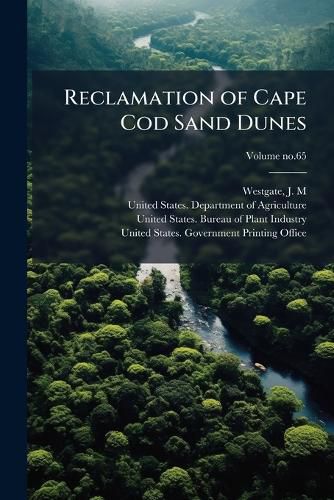Readings Newsletter
Become a Readings Member to make your shopping experience even easier.
Sign in or sign up for free!
You’re not far away from qualifying for FREE standard shipping within Australia
You’ve qualified for FREE standard shipping within Australia
The cart is loading…






Reclamation of Cape Cod Sand Dunes, Volume 65, details early 20th-century efforts to stabilize and reclaim the shifting sand dunes of Cape Cod. Authored by J.M. Westgate, in conjunction with the United States Department of Agriculture and the Bureau of Plant Industry, this document provides insights into the methodologies employed during this period to combat erosion and promote vegetation in a challenging coastal environment.
Published by the United States Government Printing Office in 1904, this work offers a valuable historical perspective on early ecological restoration techniques. It examines the selection and cultivation of appropriate plant species, as well as the engineering approaches used to manage the movement of sand. This volume will be of interest to environmental historians, botanists, and anyone concerned with the conservation of coastal landscapes.
This work has been selected by scholars as being culturally important, and is part of the knowledge base of civilization as we know it. This work was reproduced from the original artifact, and remains as true to the original work as possible. Therefore, you will see the original copyright references, library stamps (as most of these works have been housed in our most important libraries around the world), and other notations in the work.
This work is in the public domain in the United States of America, and possibly other nations. Within the United States, you may freely copy and distribute this work, as no entity (individual or corporate) has a copyright on the body of the work.
As a reproduction of a historical artifact, this work may contain missing or blurred pages, poor pictures, errant marks, etc. Scholars believe, and we concur, that this work is important enough to be preserved, reproduced, and made generally available to the public. We appreciate your support of the preservation process, and thank you for being an important part of keeping this knowledge alive and relevant.
$9.00 standard shipping within Australia
FREE standard shipping within Australia for orders over $100.00
Express & International shipping calculated at checkout
Reclamation of Cape Cod Sand Dunes, Volume 65, details early 20th-century efforts to stabilize and reclaim the shifting sand dunes of Cape Cod. Authored by J.M. Westgate, in conjunction with the United States Department of Agriculture and the Bureau of Plant Industry, this document provides insights into the methodologies employed during this period to combat erosion and promote vegetation in a challenging coastal environment.
Published by the United States Government Printing Office in 1904, this work offers a valuable historical perspective on early ecological restoration techniques. It examines the selection and cultivation of appropriate plant species, as well as the engineering approaches used to manage the movement of sand. This volume will be of interest to environmental historians, botanists, and anyone concerned with the conservation of coastal landscapes.
This work has been selected by scholars as being culturally important, and is part of the knowledge base of civilization as we know it. This work was reproduced from the original artifact, and remains as true to the original work as possible. Therefore, you will see the original copyright references, library stamps (as most of these works have been housed in our most important libraries around the world), and other notations in the work.
This work is in the public domain in the United States of America, and possibly other nations. Within the United States, you may freely copy and distribute this work, as no entity (individual or corporate) has a copyright on the body of the work.
As a reproduction of a historical artifact, this work may contain missing or blurred pages, poor pictures, errant marks, etc. Scholars believe, and we concur, that this work is important enough to be preserved, reproduced, and made generally available to the public. We appreciate your support of the preservation process, and thank you for being an important part of keeping this knowledge alive and relevant.